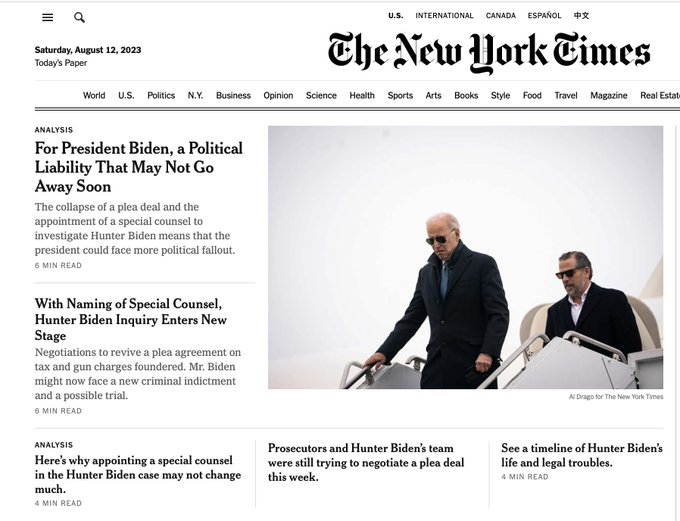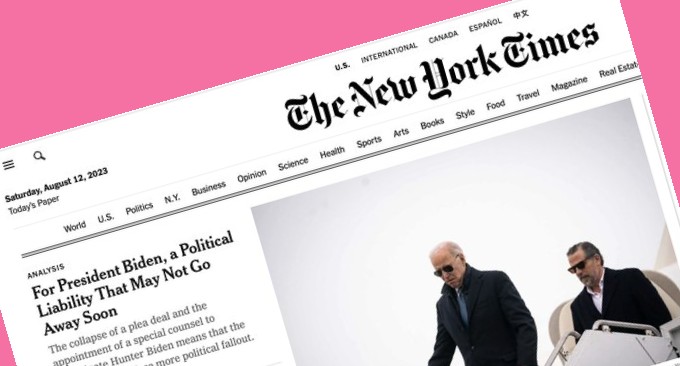Hunter Biden’s legal woes are newsworthy. No question.
But how newsworthy?
The president of the United States has a son who is deeply troubled and evidently corrupt as hell. After Hunter Biden’s plea deal with (Trump-appointed) prosecutor David Weiss blew up, Attorney General Merrick Garland appointed Weiss as a special counsel, cutting him loose from DOJ supervision. That’s all legitimate news fodder.
But no evidence has been unearthed to suggest that President Biden abetted or profited from Hunter’s frauds, beyond simply continuing to stand by him — as a good father is wont to do.
So unless that changes, it’s not really a legitimate campaign story. It’s a curiosity. Worse than that, it’s a distraction from the real stories.
Nevertheless, the highly accomplished Republican media-frenzy factory is going all out to turn it into a major story, and getting many takers in the mainstream media.
The obvious goal is confusing some voters into thinking that Biden is as much of a criminal as Donald Trump.
Which he is not.
Yet the scoop/clickbait/false-equivalence imperatives that political reporters live by are all working against logic here.
Consider the Axios article headlined “2024 has become the scandal election.”
I wish I was kidding.
Any given story about Hunter Biden (except for that one) may be defensible in and of itself. But the placement, the volume, the number of reporters assigned to the story – all of those have been excessive.
Consider this New York Times home page from Saturday:
It’s guilt by association. And even Fox News was probably more restrained.
Consider NBC’s acceptance – and promoting – of the Hunter Biden case as a “new wrench” in “the 2024 election” because “Democrats will have a harder time highlighting Trump’s indictments.”
The lead paragraph of the NBC article, by Sahil Kapur and Peter Nicholas, insists that the appointment of a special counsel is “a fresh headache” for Biden: It is “distracting from his message and potentially drawing attention away from likely GOP opponent Donald Trump’s mounting legal problems,” they wrote.
But of course it’s the article that’s doing that itself!
And the third paragraph of the piece showed the authors knew exactly what they were doing. They’d been warned, but went ahead with it anyway:
“It creates a Hillary-email vibe all over again, and it creates a false equivalency between the very real attacks on American democracy that Trump committed and much lower-scale things in this case that will muddy the waters for the 2024 election,” said Adam Green, co-founder of the Progressive Change Campaign Committee.
See also: “Hunter special counsel will cast shadow over Biden 2024 campaign,” from Reuters.
Meanwhile, the mounting indictments against Trump – which in a normal universe would disqualify him from any form of public service whatsoever not to mention the presidency – are seen by the media as a similar distraction. As simply “bogging him down“.
If that.
Jonathan Swan, Ruth Igielnik, Shane Goldmacher and Maggie Haberman just reported for the New York Times not about how Trump’s indictments make his candidacy a grotesque farce, but about the “upside-down reality” shared by many Republican voters, “where criminal charges act as political assets.”
The incomparability between the Trump and Biden “scandals” is almost too obvious to mention, but not mentioning it in a story about the Hunter Biden case is journalistically criminal.
I’d recommend something like “Despite attempts by Republicans to liken the legal perils faced by Trump and Biden, Trump faces a slew of incredibly serious criminal charges including for conspiring to steal a presidential election; Biden has been credibly accused of nothing.”
There’s also a double standard at play here, especially considering the wild amounts of corruption to be found in Trump’s immediate family.
TPM editor Josh Marshall explained in a Twitter thread:
Let’s admit that every reporter in DC knows but most won’t say for fear of falling out of favor with the bothsides rules of official DC: there is a two-tiered Justice System. One for Democrats, in which the most exacting focus on conflicts of interest are followed, often going well beyond not only what the law or established norms require but sometimes even basic logic. Meanwhile for Republicans most of these rules simply don’t apply. Ever.
It’s all very reminiscent, of course, of 2016. Back then, a legitimate mini-scandal – Hillary Clinton’s blatant violation of rules about handling government emails – was given more attention than Trump’s lifelong pattern of grifting and fraud.
In the most authoritative post-mortem of 2016 campaign journalism, Harvard government professor Thomas E. Patterson concluded that Clinton and Trump coverage by the major news organizations “was virtually identical in terms of its negative tone.” Patterson wrote:
Were the allegations surrounding Clinton of the same order of magnitude as those surrounding Trump? It’s a question that journalists made no serious effort to answer during the 2016 campaign. They reported all the ugly stuff they could find, and left it to the voters to decide what to make of it. Large numbers of voters concluded that the candidates’ indiscretions were equally disqualifying and made their choice, not on the candidates’ fitness for office, but on less tangible criteria—in some cases out of a belief that wildly unrealistic promises could actually be kept.
One study found that coverage of Clinton’s email scandals across news outlets “accounted for more sentences than all of Trump’s scandals combined (65,000 vs. 40,000) and more than twice as many as were devoted to all of her policy positions.”
Chasing bad-news stories with disproportionate vigor is just one of the damaging effects of horserace campaign journalism – as contrasted with issue-based campaign journalism, which would emphasize “not the odds, but the stakes,” as NYU professor Jay Rosen puts it.
“Whereas policy issues lack the day-to-day novelty that journalists seek, the game is always moving,” Patterson wrote in another essay. “The game is a perpetually reliable source of fresh material.”
The New York Times has never apologized for its Clinton email coverage. Maybe it will someday. Maybe the political media writ large will eventually learn the lesson of 2016, and stop getting played by a bad-faith Republican scandal machine. Or maybe that will be the lesson of 2024. Again.

There goes that liberal media again! It’s stunning how detestable the Times has become.
Thomas Patterson said ” They reported all the ugly stuff they could find, and left it to the voters to decide what to make of it.”
That’s surprising. I didn’t see any of the decades of dirt that the NYC press had unearthed on Trump reported anywhere during 2016. The Mafia connections. The lying-under-penalty-of-perjury stuff with his casinos. The judge sister who covered for him. The drug felon he employed as a personal helicopter pilot. The bogus claims about how he did at college. The “steering” of African Americans away from his father’s apartments. And even David Farenthold’s brilliant reporting on Trump’s crooked charities was barely covered elsewhere.
There was an endless supply of “ugly stuff” to publish. The media talked about the Hollywood Access tape and Stormy Daniels, but not much else.
That’s not bothsidesing. That’s willful blindness.
From what I read during the email pseudo scandal, the rules about using private email for official State Department business wasn’t changed until John Kerry became SS. Before then it was acceptable for top officials to use their private email for official communications so you are wrong that Hillary violated the rules.
No one accused Colin Powell of blatantly violating the rules for using his private email for official State Department business — because, like Hillary he hadn’t.. However not only did Powell violate the rules, he broke the the Public Records Act which deems that all official documents, including emails, must be turned over to the national archives. The ruling that emails were subject to that law was made during the Clinton administration so it clearly applied to Powell.
Powell brazenly admitted that he had not retained any of his emails— a blatant violation of the law — but no one cared. In contrast the vilified Hillary not only didn’t erase her emails, she turned over tens of thousands of them.
Powell also claimed that his emails were to staffers so they were preserved on the State Department server. That was a bald-faced lie. Powell admitted to Hillary that he had used his email account to communicate with foreign officials. Every single one of the communications he made during the run up to two wars are lost to history so we can never know what he was telling them about the false premises the Bush administration had for attacking Iraq. From Powell’s hacked emails that were made public it is clear Powell had never deliberately intended to defy our public records law. From NPR:
“ Powell cautioned Clinton to “be very careful,” lest her emails be discovered and become part of the official State Department record……Powell’s email suggests he was determined to avoid having his correspondence preserved and possibly made public, describing that as “a real danger.””
https://www.npr.org/2016/09/08/493133413/colin-powells-ways-around-disclosure-detailed-in-new-email
Funny that NPR didn’t bother to point out that unlike Hillary, Saint Colin deliberately broke the law.
Would it help if we stopped referring to what Haberman et al do as “journalism”? Call them “gossip-mongers,” “access whores,” “conflict stokers,” … anything but “journalists”. The unfortunate aspect of all this is that they’re just feeding their audience what it wants.